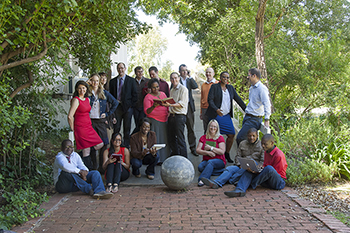Latest News Archive
Please select Category, Year, and then Month to display items
14 May 2024
|
Story ANTHONY MTHEMBU
|
Photo Supplied
 Contemporary artist Ibrahim Mahama engaging with students during his visit to the Department of Fine Arts at the University of the Free State (UFS).
Contemporary artist Ibrahim Mahama engaging with students during his visit to the Department of Fine Arts at the University of the Free State (UFS).
Ghanaian contemporary artist, Ibrahim Mahama, visited the Department of Fine Arts at the University of the Free State (UFS) to share insights with staff and students during his stay in the country.
Dr Adelheid Von Maltitz, Senior Lecturer in the Department of Fine Arts at the UFS, highlighted the significance of Mahama’s visit which took place from 21 to 28 March 2024, marking the first instance of such interaction between a Fine Arts department in South Africa and Mahama. She remarked, “It is truly astounding that a person of his calibre dedicated time to focus on our department, and I believe this has catalysed a positive shift within our department.”
Mahama’s impactful presence at UFS
Dr Von Maltitz emphasised that Mahama’s visit aimed to offer staff and students a glimpse into his artistic process and mindset. During his time at the UFS, Mahama, who was virtually overseeing his latest recent large-scale artwork titled Purple Hibiscus, which involved wrapping the Barbican Centre in London, engaged extensively with staff and students from the department about their research. He shared insights into his creative journey, presented select works, and conducted critique sessions with fourth year and postgraduate students, among other activities. Dr Von Maltitz believes this interaction, particularly with students, has significantly bolstered their confidence as aspiring artists, preparing them for professional endeavours.
Broader implications and future prospects
Mahama’s visit not only energised the department’s academic environment but also holds broader implications. Dr Von Maltitz asserted that it will solidify the department’s identity nationally and create avenues for students to pursue residencies in countries like Ghana. Therefore, maintaining a fruitful relationship with Mahama remains a priority for the department.
Reflecting on the visit Dr Von Maltitz concluded, ‘’the key takeaway, especially for the students, was witnessing the potential of their works within the broader South African and international contexts. “
Prestige Scholars Programme invests in promising academics
2015-06-24

Photo: Sonia Small |
Whilst many academics find it challenging to have sustainable funding for specific projects, it is often just as challenging to find relevant exposure and good mentorship programmes to fully prepare academics toward becoming full professors.
Prof Jonathan Jansen, Vice-Chancellor and Rector of the UFS, designed the Vice-Chancellor’s Prestige Scholars Programme (PSP) specifically targeting newly-completed post-doctoral students who are already members of the academic staff.
The goal is to select the most promising young scholars and to make substantial institutional investment in their development.
To date, the PSP has produced 2 Fulbright scholars; 10 National Research Foundation (NRF) rated scholars; 1 NRF Blue Skies research project and 14 NRF Thuthuka-funded projects. These scholars work with the best academics at leading universities on three continents.
Prof Jackie du Toit, co-director of the programme, explains that while the PSP does not provide funding, it is a great programme to empower scholars by means of assistance towards generating funding from outside sources.
Prof Du Toit co-directs this programme with Proff Corli Witthuhn, Vice-Rector: Research and Niel Roos from the Department of Africa Studies.
“The PSP bases its approach to funding on the philosophy that young scholars are to be encouraged towards financial independence, based on a viable postdoctoral project that would sustain their scholarship for five to eight years post PhD. We believe that the cachet and long-term sustainability of existing funding programmes such as Fulbright outweighs the short-term benefits of automatic funding from the PSP. We also endeavour to teach young scholars to work cleverly within institutional parameters, rather than leave them floundering once they step off the active PSP.”